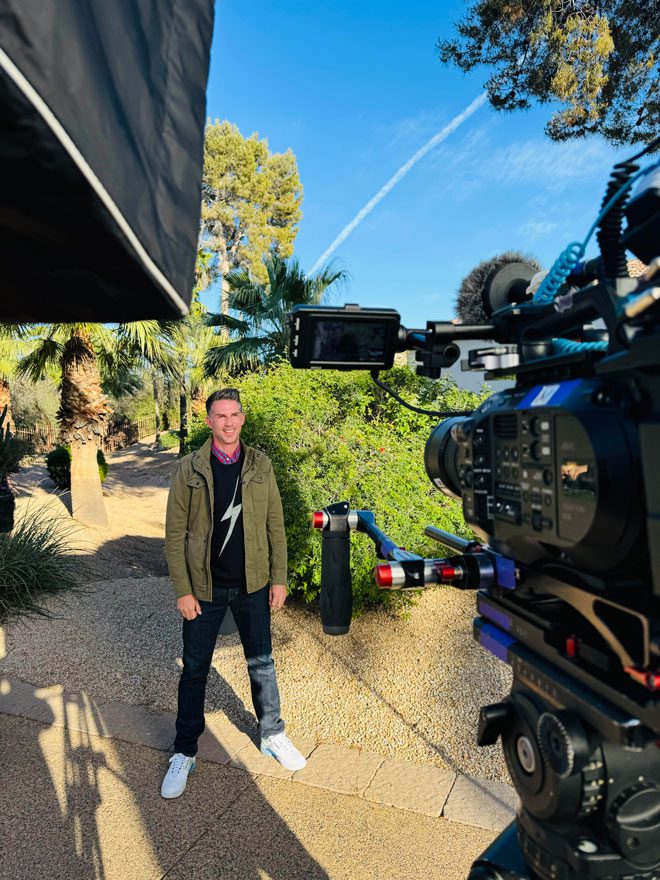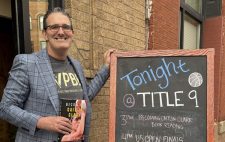Helping couples on the verge of divorce survive the toughest stretch of their relationship is difficult on a regular day. Doing it followed by TV cameras while hiking through the desert with millions of people watching is another thing entirely.
“It was a learning experience, for sure,” says James Kelleher. “I’m used to providing therapy where it’s private, in a small, safe, comfortable location. Now I have 20 cameras on me. While I am a therapist, there was a level of anxiety for me with public speaking and being on stage, so to speak.”

Despite that anxiety, Kelleher signed on last year to be one of three therapists in season 2 of TLC’s “90 Day: The Last Resort.” The spin-off show follows six fan-favorite couples from the hit show, “90 Day Fiancé,” as they try to save their relationships.
Kelleher and his co-hosts, fellow therapist Heidi Clapham and sexuality educator Reba Thomas, used both traditional and unconventional forms of therapy to navigate the couples’ marital troubles – ranging from infidelity to past traumas – during a three-week couples’ retreat in Arizona.
“When I got the casting email, I thought it was fake,” says Kelleher, a Willingboro native who now lives in Arizona. “But a few days later, I got another one and did a little research. I talked to the casting director, and they were like, ‘We’re gonna push this forward to producers.’ It happened overnight, the universe just put it in my lap.”
And so Kelleher prepared for a whole new experience: life on Reality TV. Well, he tried to prepare. “I don’t know how much you can really be prepared. You’re kind of at the mercy of production,” he says. “You could be scheduled to film for four hours, and then boom, something’s happening with a couple, and they need you on set or to go to a room or space and do a therapy session. It’s not your traditional 9-to-5 job.”
That’s how Kelleher ended up on an unplanned 1.5-mile hike through the Arizona desert, trailed by cameras, helping one of the couples talk through a heated (literally) argument.
“I was supposed to present the activity, almost like the host of a show and then leave, but it turned into a couple fighting,” Kelleher says. “The next thing you know, I’m chasing someone through a parking lot and hiking up a mountain. Then I’m going on a whole hike, the sun’s burning on my face. That moment really stood out.”
Luckily, Kelleher’s more than two decades as a therapist, which included counseling students in NYC following 9/11, were enough to prepare him for the twists and turns of reality TV relationships. “There are certain topics I’m familiar with when it comes to communication and breakdowns, and relationship therapy,” he says. “While I may not know your specific type of issue in that moment, I’m well-versed to be able to hop in, whether it’s to mediate and diffuse the situation or talk somebody off a ledge and teach communication skills.”
When the season premiered last December, Kelleher was surrounded by friends and family at a bar in Arizona to watch his TV debut. And to see what pieces of his whirlwind experience made the cut.
“I was new to social media, and I’ll say it’s a 50/50 experience. It’s half fun and amazing, and then also a little overwhelming and full of some not-so-good people. I was prepared, but I wasn’t.”
“I’m watching the episodes to see what makes the edit,” Kelleher says. “We would spend hours doing regular therapy sessions – an hour individually with this person, an hour with the couples – and part of the adjustment was putting all these hours in, and it could turn into a minute clip, or even seconds.”
But, of course, Kelleher isn’t the only one watching week after week to see how the story unfolds. He’s become all-too-familiar with the thousands of fans that analyze, praise and criticize every aspect of the “90 Day” multiverse on social media.
“I was new to social media, and I’ll say it’s a 50/50 experience,” Kelleher says. “It’s half fun and amazing, and then also a little overwhelming and full of some not-so-good people. I was prepared, but I wasn’t.”
As someone who’s worked in mental health for decades, Kelleher reminded himself going into this world that even if you’re the best at what you do, someone will have negative comments to share online. But even with that knowledge, he found the reactions challenging at times.
“It’s opened my eyes to a lot of experiences people may have that affect their mental health,” he says. “If I’m a grown man who is a therapist and this affects me and stings, I can’t imagine other adults and youth without coping skills having to navigate the world of social media and negative comments.”
So six months ago, after the show wrapped, he started a podcast called “Living Life with James” to push back against negativity – or at least, to help people cope with it. “The podcast is about me being able to look at lives and share lives through two different lenses,” he says. “One is with other professionals to educate and share tools and tips about navigating life. The other part is hearing people’s stories, their triumphs and struggles and how it can inspire us to move forward in our own journeys.”
That human connection is what drove Kelleher to accept this life-changing opportunity in the first place. It’s also, in a way, what started him on the path to becoming a therapist. While attending Willingboro High School, he joined a club that provided mediation for students experiencing conflict and crisis.
And while the stories, traumas and experiences he hears in his sessions have changed through the years – although some of them are recurring – what hasn’t changed is his passion for helping people heal.
“Our history and our past definitely shapes who we are,” he says. “It affects our behaviors, but how we’re living today is almost more important. How are we going to show up differently for ourselves, our relationships and our families? Doing the work and being present now and learning from these behaviors, it changes your world.”
















